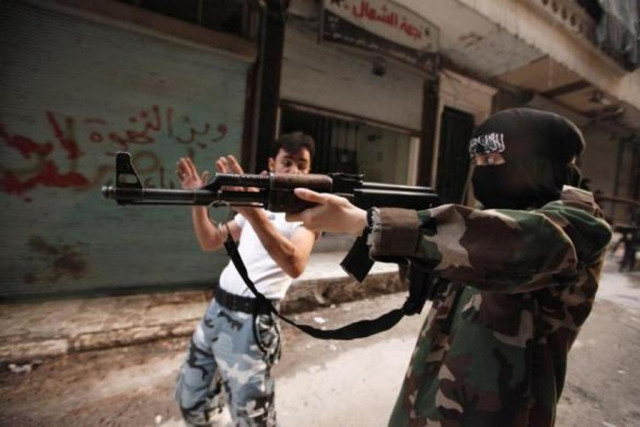Syria arms inspectors face unprecedented danger: UN
The experts will have to work in "dangerous and volatile" conditions, particularly in urban areas.

A female member of the "Mother Aisha" battalion receives instruction as she holds a rifle during military training in Aleppo's Salaheddine district, September 19, 2013. PHOTO: REUTERS
The experts "will seek to conduct an operation the likes of which, quite simply, have never been tried before," Ban said, in a report to the UN Security Council obtained by AFP.
A joint United Nations and Organization for the Prohibition of Chemical Weapons (OPCW) mission would supervise the destruction of President Bashar alAssad's chemical arms in line with a Security Council resolution passed on September 27.
After months of diplomatic sparring, Russia and the United States agreed to work together to disarm Syria after a chemical weapons attack near Damascus on August 21 in which hundreds died.
Their disarmament plan, aiming for the chemical arsenal to be destroyed by mid-2014, has been approved by the OPCW executive and the Security Council. A small team of experts is already in Syria to start the destruction of weapons production facilities. Ban recommended it be increased to about 100 scientists, logistics and security experts who will stay for up to a year.
If his recommendations are approved, the mission will have its headquarters in Damascus with a support base in Cyprus.
Ban highlighted the threat to the experts and Syrian civilians from the estimated 1,000 tonnes of sarin, mustard gas and other chemical horrors in the arsenal which will have to be moved amid the "carnage" of Assad's daily battle with opposition’s rebels.
"The joint mission will be expected to support, monitor and verify the destruction of a complex chemical weapons program involving multiple sites spread over a country engulfed in violent conflict," Ban said. "The timelines associated with this destruction phase would be ambitious under the most peaceful and benign of circumstances."
The experts will have to work in "dangerous and volatile" conditions, particularly in urban areas such as Damascus, Homs and Aleppo, the UN leader said. "Heavy artillery, air strikes, mortar barrages and the indiscriminate shelling of civilians areas are commonplace and battle lines shift quickly," he added.
Two mortars landed near the Damascus hotel the team is using just before they arrived last week. Ban added that roadside bombs "have detonated in close proximity" to the inspectors.
"My two highest priorities are the elimination of the Syrian chemical weapons program and the safety and security of joint mission personnel who have volunteered to perform this vital but dangerous task," he vowed.
The OPCW will provide the disarmament experts and the UN will supply logistics, communications and security staff for the mission, Ban said.
The report gave no estimate for the cost of what experts say will be the biggest and most dangerous disarmament operation ever staged. But Ban said the OPCW and UN would start their own special trust funds from international contributors. Assad has already estimated a cost of at least one billion dollars.
The mission has until November 1 to inspect chemical weapons sites declared by the Syrian government and oversee the destruction of production and chemical mixing facilities. That work started Sunday.
Under the Russia-US timetable, the experts will then have until the end of June to supervise the transport and destruction of the chemicals. The Syrian government remains responsible for the destruction activities however.
The inspectors will also be monitoring for breaches of the weapons accord that Assad's government has made. The UN Security Council resolution passed on September 27 said the 15-country body would take "measures" under Chapter VII of the UN Charter if an infringement is proved.
Chapter VII allows for possible military action or sanctions. But Russia, Assad's key diplomatic ally, strongly opposes any move toward the use of force against the Damascus government.



















COMMENTS
Comments are moderated and generally will be posted if they are on-topic and not abusive.
For more information, please see our Comments FAQ